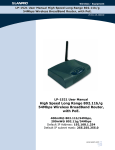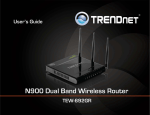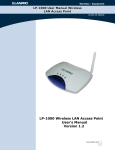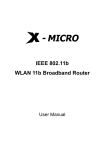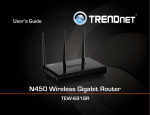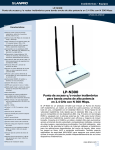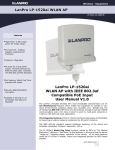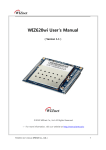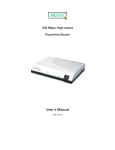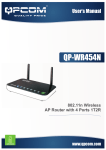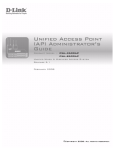Download LP-1522 User Manual. High Speed Long Range 802.11b/g 54Mbps
Transcript
Wireless - Equipment LP-1522 User Manual. High Speed Long Range 802.11b/g ,54Mbps Wireless Broadband AP and Router, High Power (800mW) with External Antenna. LP1522_UM_ENB02W LP-1522 User Manual. High Speed Long Range 802.11b/g 54Mbps Wireless Broadband AP and Router, High Power (800mW), with External Antenna. www.lanpro.com Wireless - Equipment - 2.4 GHz - LP-1522 User Manual Trademarks Copyright @2009 Contents are subject to change without notice. All trademarks belong to their respective proprietors. Copyright Statement THIS DOCUMENT CONTAINS OF PROPRIETARY TECHNICAL INFORMATION THAT IS THE PROPERTY OF THIS COMPANY. AND NO PART OF THIS DOCUMENTATION MAY BE REPRODUCED, STORED IN A RETRIEVAL SYSTEM OR TRANSMITTED IN ANY FORM OR BY ANY MEANS, ELECTRICAL OR MECHANICAL, BY PHOTOCOPYING, RECORDING, OR OTHERWISE, WITHOUT THE PRIOR WRITTEN CONSENT OF THIS COMPANY. Federal Communication Commission Interference Statement This equipment has been tested and found to comply with the limits for a Class B digital device, pursuant to Part 15 of the FCC Rules. These limits are designed to provide reasonable protection against harmful interference in a residential installation. This equipment generates, uses and can radiate radio frequency energy and, if not installed and used in accordance with the instructions, may cause harmful interference to radio communications. However, there is no guarantee that interference will not occur in a particular installation. If this equipment does cause harmful interference to radio or television reception, which can be determined by turning the equipment off and on, the user is encouraged to try to correct the interference by one of the following measures: • • • • Reorient or relocate the receiving antenna. Increase the separation between the equipment and receiver. Connect the equipment into an outlet on a circuit different from that to which the receiver is connected. Consult the dealer or an experienced radio/TV technician for help. This device complies with Part 15 of the FCC Rules. Operation is subject to the following two conditions: (1) This device may not cause harmful interference, and (2) this device must accept any interference received, including interference that may cause undesired operation. FCC Caution: Any changes or modifications not expressly approved by the party responsible for compliance could void the user’s authority to operate this equipment. IMPORTANT NOTE: FCC Radiation Exposure Statement: This equipment complies with FCC radiation exposure limits set forth for an uncontrolled environment. This equipment should be installed and operated with minimum distance 20cm between the radiator & your body. This transmitter must not be co-located or operating in conjunction with any other antenna or transmitter. Revision History DATE REVISION OF USER’S MANUAL FIRMWARE 2009/7/27 Version B01 (g/v)1.4.d 2 www.lanpro.com Wireless - Equipment - 2.4 GHz - LP-1522 User Manual Terminology 3DES Triple Data Encryption Standard AES Advanced Encryption Standard ANSI American National Standards Institute AP Access Point CCK Complementary Code Keying CSMA/CA Carrier Sense Multiple Access/ Collision Avoidance CSMA/CD Carrier Sense Multiple Access/ Collision Detection DDNS Dynamic Domain Name Server DH Diffie-Hellman Algorithm DHCP Dynamic Host Configuration Protocol DSSS Direct Sequence Spread Spectrum EAP Extensible Authentication Protocol ESP Encapsulating Security Payload FCC Federal Communications Commission FTP File Transfer Protocol IEEE Institute of Electrical and Electronic Engineers IKE Internet Key Exchange IP Internet Protocol ISM Industrial, Scientific and Medical LAN Local Area Network MAC Media Access Control MD5 Message Digest 5 NAT Network Address Translation NT Network Termination NTP Network Time Protocol PPTP Point to Point Tunneling Protocol PSD Power Spectral Density RF Radio Frequency SHA1 Secure Hash Algorithm SNR Signal to Noise Ratio SSID Service Set Identification TCP Transmission Control Protocol TFTP Trivial File Transfer Protocol TKIP Temporal Key Integrity Protocol UPNP Universal Plug and Play VPN Virtual Private Network WDS Wireless Distribution System WEP Wired Equivalent Privacy WLAN Wireless Local Area Network WPA Wi-Fi Protected Access 3 www.lanpro.com Wireless - Equipment - 2.4 GHz - LP-1522 User Manual 1 Introduction The LP-1522 High Power (800mW) AP and Broadband Router with advanced security is specially designed for Hot Spots and Enterprises. Any 802.11b or 802.11g client can Access the Ethernet resources through the LP-1522. A comprehensive set of characteristics permit clients access to the office network while maintaining a high level of security. A PoE enabled Ethernet data port with the 48 VDC standard, and it´s small size makes it ideal for tight spaces and/or ceiling mounting. By delivering 800 mW into the antenna, it surpasses the competency. The LP-1522 constitutes the most cost-effective solution for providing 54Mbps into a WLAN. A robust metal sheet case provides better protection against vandalism and dissipates heat in a more efficient way. This unit can be fixed to a wall, ceiling, cabinet or supplied inside an all-weather enclosure, in conjunction with a 1 10/100 LAN port switch and the 120VAC power input, ready for field installation. The Wireless LAN Broadband LanPro 1522 Router is an affordable IEEE 802.11b/g wireless LAN broadband router solution; setting SOHO and enterprise standard for high performance, secure, manageable and reliable WLAN. This document describes the steps required for the initial IP address assign and other WLAN router configuration. The description includes the implementation of the above steps. 1.1 • • • • • • • • • • • • • • • • • • • • • Characteristics Gateway modes support. High Power ( 0.8W) for a wider range of operation. Complies the 802.11b/g standard. Encryption WEP, WPA- 64/128bit (WEP), WPA TKIP. WLAN users access control. Wireless sites survey. TCP/UDP/ICMP/ARP protocol stack. Dynamic DNS. WDS. VPN Pass-through with multiple sessions. Firewall, DoS, IP/Port/MAC filtering. Virtual DMZ. Cient/server DHCP. PPPoE PPTP. DHCP client. Fixed IP address. UPnP . 1 LAN 10/100 Kbps port. 1 WAN Access port. Physical protection: Robust metal sheet box. Can be powered through a local 12 VDC power supply or through the IEEE 802.3af PoE standard • • • • • 4 enabled LAN port. Self Healing: Watch Dog Timer reset. Can be used as an AP, Router, Bridge, Hot Spot repeater. Reset push buttont. WDS push button. Indicator Led Lights: PWR, WLAN, WAN, LAN, WPS. www.lanpro.com Wireless - Equipment - 2.4 GHz - LP-1522 User Manual 1.2 Technical Specifications Ethernet port: 1.3 Standard 802.11b/g(Inalámbrico), 802.3u(100BaseT) Dat transfer rate 54Mbps(Wireless), 100Mbps(Ethernet) Modulation Method CCK(802.11b), OFDM(802.11g) Frequency Bands 2.4GHz - 2.483GHz ISM Band, DSSS RF Output Power CCK< 29dBm (Typical)±1, OFDM< 25dBm (Typical)±1 Receiver sensitivity: 802.11b -108 dBm@10%, 802.llg -98 dBm@8% Operating Range 600 to 2000 m (obstacle and surroundings dependent) Security 64 bit/ 128 bit WEP, WPA, WPA2, port filtering, IP filtering MAC filtering Port forwarding y Hosting DMZ Local Power 12 VDC Power over Ethernet Standard: 802.3af Operation temperature: 0 ~ 50°C Storage temperature -20 ~ 70°C Humidity without condensation: 95 % max @ 55ºC Dimensions: 190 165 x 120 mm Package contents The package of the LP-1522 WLAN Broadband Router includes the following items: • • • • The LP 1522 WLAN Broadband Router The AC to DC power adapter The Documentation CD 1.8m RJ-45 Cable Line (Option) 2 Installation 2.1 Hardware Installation Step 1: Place the WLAN AP Router to the optimum transmission location. The best transmission location for your WLAN AP Router is usually at the geographic center of your wireless network, with line of sign to all of your mobile stations. Step 2: Connect the WLAN AP Router to your wired network. Connect the Ethernet WAN interface of WLAN AP Router by category 5 Ethernet cable to your switch/ hub/ xDSL modem or cable modem. A straight-through Ethernet cable with appropriate cable length is needed. Step 3: Supply DC power to the WLAN AP Router. Use only the AC power adapter supplied with the WLAN AP Router; it may occur damage by using a different type of power adapter. The hardware installation is finished. 5 www.lanpro.com Wireless - Equipment - 2.4 GHz - LP-1522 User Manual 2.2 Software Installation There are no software drivers, patches or utilities installation needed, but only the configuration setting. Please refer to chapter 3 for software configuration. Notice: It will take about 1 minute to complete the boot up sequence after powered on the WLAN AP Router; Power LED will be active, and after that the WLAN Activity LED will be flashing to show the WLAN interface is enabled and working now. 3 Software configuration The web based management and configuration functions easily allow you perform the step-by-step configuration. The WLAN AP Router is delivered with the following factory default parameters on the Ethernet LAN interfaces. Default IP Address: 192.168.1.254 Default IP subnet mask: 255.255.255.0 WEB login User Name: <empty> WEB login Password: <empty> 3.1 Prepare your PC to configure the WLAN AP Router For Microsoft Windows 95/ 98/ ME: 1. Click the Start button and select Settings, then click Control Panel. The Control Panel window will appear. Note: Windows Me users may not see the Network control panel. If so, select View all Control Panel options on the left side of the window. 2. Move mouse and double-click the right button on Network icon. The Network window will appear. 3. Check the installed list of Network Components. If TCP/IP is not installed, click the Add button to install it; otherwise go to step 6. 4. Select Protocol in the Network Component Type dialog box and click Add button. 5. Select TCP/IP in Microsoft of Select Network Protocol dialog box then click OK button to install the TCP/IP protocol, it may need the Microsoft Windows CD to complete the installation. Close and go back to Network dialog box after the TCP/ IP installation. 6. Select TCP/IP and click the properties button on the Network dialog box. 7. Select Specify an IP address and type in values as following example. • IP Address: 192.168.1.1, IP address within the range of 192.168.1.1 to 192.168.1.253 is used to connect the WLAN AP Router. • IP Subnet Mask: 255.255.255.0 8. Click OK and reboot your PC after completing the IP parameters setting. 6 www.lanpro.com Wireless - Equipment - 2.4 GHz - LP-1522 User Manual For Microsoft Windows 2000/XP: 1. Click the Start button and select Settings, then click Control Panel. The Control Panel window will appear. 2. Move mouse and double-click the right button on Network and Dial-up Connections icon. Move mouse and doubleclick the Local Area Connection icon. The Local Area Connection window will appear. Click Properties button in the Local Area Connection window. 3. Check the installed list of Network Components. If TCP/IP is not installed, click the Add button to install it; otherwise go to step 6. 4. Select Protocol in the Network Component Type dialog box and click Add button. 5. Select TCP/IP in Microsoft of Select Network Protocol dialog box then click OK button to install the TCP/IP protocol, it may need the Microsoft Windows CD to complete the installation. Close and go back to Network dialog box after the TCP/IP installation. 6. Select TCP/IP and click the properties button on the Network dialog box. 7. Select Specify an IP address and type in values as following example. • IP Address: 192.168.1.1, IP address within the range of 192.168.1.1 to 192.168.1.253 is used to connect the WLAN AP Router. • IP Subnet Mask: 255.255.255.0 For Microsoft Windows NT: 1. Click the Start button and select Settings, then click Control Panel. The Control Panel window will appear. 2. Move mouse and double-click the right button on Network icon. The Network window will appear. Click Protocol tab from the Network window. 3. Check the installed list of Network Protocol window. If TCP/IP is not installed, click the Add button to install it; otherwise go to step 6. 4. Select Protocol in the Network Component Type dialog box and click Add button. 5. Select TCP/IP in Microsoft of Select Network Protocol dialog box then click OK button to install the TCP/IP protocol, it may need the Microsoft Windows CD to complete the installation. Close and go back to Network dialog box after the TCP/ IP installation. 6. Select TCP/IP and click the properties button on the Network dialog box. 7. Select Specify an IP address and type in values as following example. - IP Address: 192.168.1.1, IP address within the range of 192.168.1.1 to 192.168.1.253 is used to connect the WLAN AP Router. - IP Subnet Mask: 255.255.255.0 8. Click OK to complete the IP parameters setting. 7 www.lanpro.com Wireless - Equipment - 2.4 GHz - LP-1522 User Manual 3.2 Connect to the WLAN AP Router Open a WEB browser, i.e. Microsoft Internet Explore, then enter 192.168.1.254 on the URL to connect the WLAN AP Router. 3.3 Management and configuration on the WLAN AP Router 3.3.1 Status This page shows the current status and some basic settings of the device, includes system, wireless, Ethernet LAN and WAN configuration information. Screen snapshot – Status Item Description System Uptime It shows the duration since WLAN AP Router is powered on. Firmware version It shows the firmware version of WLAN AP Router. Wireless configuration Mode It shows wireless operation mode Band It shows the current wireless operating frequency. SSID It shows the SSID of this WLAN AP Router. The SSID is the unique name of WLAN AP Router and haredamong its service area, so all device sat tempts to join the samewireless network can identify it. Channel Number It shows the wireless channel connected currently. Encryption It shows the status of encryption function. Associated Clients It shows the number of connected clients (or stations,PCs). BSSID It shows the BSSID address of the WLAN AP Router.BSSID is a six-byte address. LAN configuration IP Address It shows the IP address of LAN interfaces of WLAN AP Router. Subnet Mask It shows the IP subnet mask of LAN interfaces of WLAN AP Router. Default Gateway It shows the default gateway setting for LAN interfaces outgoing data packets. 8 www.lanpro.com Wireless - Equipment - 2.4 GHz - LP-1522 User Manual DHCP Server It shows the DHCP server is enabled or not. MAC Address It shows the MAC address of LAN interfaces of WLAN AP Router. WAN configuration Attain IP Protocol It shows how the WLAN AP Router gets the IP address. The IP address can be set manually to a fixed one or set dynamically by DHCP server or attain IP by PPPoE / PPTP connection. IP Address It shows the IP address of WAN interface of WLAN AP Router. Subnet Mask It shows the IP subnet mask of WAN interface of WLAN AP Router. Default Gateway It shows the default gateway setting for WAN interface outgoing data packets. MAC Address It shows the MAC address of WAN interface of WLAN AP Router. 3.3.2 Setup Wizard This page guides you to configure wireless AP router for first time. Screen snapshot - Setup Wizard I.Operation Mode. This page followed by Setup Wizard page to define the operation mode. Screen snapshot Operation Mode 9 www.lanpro.com Wireless - Equipment - 2.4 GHz - LP-1522 User Manual II. Time Zone Setting. This page is used to enable and configure NTP client Screen snapshot Time Zone Settings III. LAN Interface Setup. Screen snapshot LAN Interface Setup IV. WAN Interface Setup. This page is used to configure WAN access type Screen snapshot WAN Interface Setup 10 www.lanpro.com Wireless - Equipment - 2.4 GHz - LP-1522 User Manual V. Wireless Basic Settings. This page is used to configure basic wireless parameters like Band, Mode, Network Type SSID, Channel Number, Enable Mac Clone(Single Ethernet Client). Screen snapshot Wireless Basic Settings VI. Wireless Security Setup. This page is used to configure wireless security Screen snapshot Wireless Security Setup 3.3.3 Operation Mode This page is used to configure which mode wireless AP router acts Screen snapshot Operation Mode 11 www.lanpro.com Wireless - Equipment - 2.4 GHz - LP-1522 User Manual Item Description Gateway Traditional gateway configuration. It always connects internet via ADSL/Cable Modem. LAN interface, WAN interface, Wireless interface, NAT and Firewall modules are applied to this mode Bridge Each interface (LAN, WAN and Wireless) regards as bridge. NAT, Firewall and all router’s functions are not supported Wireless ISP Switch Wireless interface to WAN port and all Ethernet ports in bridge mode. Wireless interface can do all router’s functions Apply Changes Click the Apply Changes button to complete the new configuration setting. Reset Click the Reset button to abort change and recover the previous configuration setting. 3.3.4 Wireless - Basic Settings This page is used to configure the parameters for wireless LAN clients that may connect to your AP Router. Here you may change wireless encryption settings as well as wireless network parameters. Screen snapshot. Wireless Basic Settings Item Description Disable Wireless LAN Interface Click on to disable the wireless LAN data transmission. Band Click to select 2.4GHz(B) / 2.4GHz(G) / 2.4GHz(B+G) Mode Click to select the WLAN AP / Client / WDS / AP+WDS wireless mode. Site Survey The Site Survey button provides tool to scan the wireless network. If any Access Point or IBSS is found, you could choose to connect it manually when client mode is enabled. Refer to 3.3.9 Site Survey. SSID It is the wireless network name. The SSID can be 32 bytes long. Channel Number Select the wireless communication channel from pull-down menu Associated Clients Click the Show Active Clients button to open Active Wireless Client Table that shows the MAC address, transmit-packet, receive-packet and transmission-rate for each associated wireless client. Enable Mac Clone (Single Ethernet Client) Take Laptop NIC MAC address as wireless client MAC address. [Client Mode only] Apply Changes Click the Apply Changes button to complete the new configuration setting. Reset Click the Reset button to abort change and recover the previous configuration setting. 12 www.lanpro.com Wireless - Equipment - 2.4 GHz - LP-1522 User Manual 3.3.5 Wireless - Advanced Settings These settings are only for more technically advanced users who have a sufficient knowledge about wireless LAN. These settings should not be changed unless you know what effect the changes will have on your WLAN AP Router. Screen snapshot Wireless Advanced Settings Item Description Authentication Type Click to select the authentication type in Open System, Shared Key or Auto selection. Fragment Threshold Set the data packet fragmentation threshold, value can be written between 256 and 2346 bytes. Refer to 4.10 What is Fragment Threshold? Refer to 4.10 What is Fragment Threshold? RTS Threshold Set the RTS Threshold, value can be written between 0 and 2347 bytes. Refer to 4.11 What is RTS(Request To Send) Threshold? Beacon Interval Set the Beacon Interval, value can be written between 20 and 1024 ms. Refer to 4.12 What is Beacon Interval? Data Rate Select the transmission data rate from pull-down menu. Data rate can be auto-select, 11M, 5.5M, 2M or IMbps. Preamble Type Click to select the Long Preamble or Short Preamble support on the wireless data packet transmission. Refer to 4.13 What is Preamble Type? Broadcast SSID Click to enable or disable the SSID broadcast function. Refer to 4.14 What is SSID Broadcast? IAPP Click to enable or disable the IAPP function. Refer to 4.20 What is Inter-Access Point Protocol(IAPP)? 802.1 lg Protection Protect 802.1 lb user. RF Power Level Select the TX Power from 18-19dBm to 24-26dbm. ACK Timeout The Acknowledgement Timeout means from remote to local data transmission, one parameter to control both acknowledging action to guaranty those packets have already be received. Usually, for short distance, keep default setting is proposed. If there is long distance application, have minor increased with this parameter will be proposed. Apply Changes Click the Apply Changes button to complete the new configuration setting. Reset Click the Reset button to abort change and recover the previous configuration setting. 13 www.lanpro.com Wireless - Equipment - 2.4 GHz - LP-1522 User Manual 3.3.6 Wireless - Security Setup This page allows you setup the wireless security. Turn on WEP, WPA, WPA2 by using encryption keys could prevent any unauthorized access to your wireless network. Screen snapshot Wireless Security Setup Item Description Encryption Select the encryption supported over wireless access. The encryption method can be None, WEP, WPA(TKIP), WPA2 or WPA2 Mixed Refer to 4.9 What is WEP? 4.15 What is Wi-Fi Protected Access (WPA)? 4.16 What is WPA2CAES1? 4.17 What is 802. IX Authentication? 4.18 What is Temporal Key Integrity Protocol (TKIP)? 4.19 What is Advanced Encryption Standard (AES)? Use 802. lx While Encryption is selected to be WEP. Authentication Click the check box to enable IEEE 802. lx authentication function. Refer to 4.16 What is 802.1 x Authentication? WPA Authentication Mode While Encryption is selected to be WPA. Click to select the WPA Authentication Mode with Enterprise (RADIUS) or Personal (Pre-Shared Key). Refer to 4.15 What is Wi-Fi Protected Access (WPA)? Pre-Shared Key Format While Encryption is selected to be WPA. Select the Pre-shared key format from the pull-down menu. The format can be Passphrase or Hex (64 characters). [WPA, Personal(Pre-Shared Key) only] Pre-Shared Key Fill in the key value. [WPA, Personal(Pre-Shared Key) only] Enable Pre-Authentication Click to enable Pre-Authentication. [WPA2/WPA2Mixed only, Enterprise only] Authentication RADIUS Server Set the IP address, port and login password information of authentication RADIUS sever. Apply Changes Click the Apply Changes button to complete the new configuration setting. Reset Click the Reset button to abort change and recover the previous configuration setting. 14 www.lanpro.com Wireless - Equipment - 2.4 GHz - LP-1522 User Manual I. WEP Key Setup Screen snapshot WEP Key Setup Item Description Key Length Select the WEP shared secret key length from pull-down menu. The length can be chose between 64-bit and 128-bit (known as “WEP2”) keys. The WEP key is composed of initialization vector (24 bits) and secret key (40-bit or 104-bit). Key Format Select the WEP shared secret key format from pull-down menu. The format can be chose between plant text (ASCII) and hexadecimal (HEX) code. Default Tx Key Set the default secret key for WEP security function. Value can be chose between 1 and 4. Encryption Key 1 Secret key 1 of WEP security encryption function. Encryption Key 2 Secret key 2 of WEP security encryption function. Encryption Key 3 Secret key 3 of WEP security encryption function. Encryption Key 4 Secret key 4 of WEP security encryption function. Apply Changes Click the Apply Changes button to complete the new configuration setting. Close Click to close this WEP Key setup window. Reset Click the Reset button to abort change and recover the previous configuration settings 15 www.lanpro.com Wireless - Equipment - 2.4 GHz - LP-1522 User Manual 3.3.7 Wireless - Access Control If you enable wireless access control, only those clients whose wireless MAC addresses are in the access control list will be able to connect to your Access Point. When this option is enabled, no wireless clients will be able to connect if the list contains no entries. Screen snapshot Wireless Access Control Item Description Wireless Access Control Mode Click the Disabled, Allow Listed or Deny Listed of drop down menu choose wireless access control mode. This is a security control function; only those clients registered in the access control list can link to this WLANAP Router. MAC Address Fill in the MAC address of client to register this WLAN AP Router access capability. Comment Fill in the comment tag for the registered client. Apply Changes Click the Apply Changes button to register the client to new configuration setting. Reset Click the Reset button to abort change and recover the previous configuration setting. Current Access Control List It shows the registered clients that are allowed to link to this WLAN AP Router. Delete Selected Click to delete the selected clients that will be access right removed from this WLAN AP Router. Delete All Click to delete all the registered clients from the access allowed list. Reset Click the Reset button to abort change and recover the previous configuration setting. 3.3.8 WDS Settings Wireless Distribution System uses wireless media to communicate with other APs, like the Ethernet does. To do this, you must set these APs in the same channel and set MAC address of other AP that you want to communicate with in the table and then enable the WDS. Screen snapshot - WDS Setup 16 www.lanpro.com Wireless - Equipment - 2.4 GHz - LP-1522 User Manual Item Description Enable WDS Click the check box to enable wireless distribution system. Refer to 4.21 What is Wireless Distribution Svstem (WDS)? MAC Address Fill in the MAC address of AP to register the wireless distribution system access capability. Comment Fill in the comment tag for the registered AP. Apply Changes Click the Apply Changes button to register the AP to new configuration setting. Reset Click the Reset button to abort change and recover the previous configuration setting. Set Security Click button to configure wireless security like WEP(64bits), WEP(128bits), WPA(TKIP), WPA2(AES) or None Show Statistics It shows the TX, RX packets, rate statistics Delete Selected Click to delete the selected clients that will be removed from the wireless distribution system. Delete All Click to delete all the registered APs from the wireless distribution system allowed list. Reset Click the Reset button to abort change and recover the previous configuration setting. I. WDS Security Setup. Requirement: Set [Wireless]->[Basic Settings]->[Mode]->AP+WDS This page is used to configure the wireless security between APs. Refer to 3.3.6 Wireless Security Setup. Screen snapshot WPS Security Setup II. WDS AP Table. This page is used to show WDS statistics. Screen snapshot - WDS AP Table 17 www.lanpro.com Wireless - Equipment - 2.4 GHz - LP-1522 User Manual Item Description MAC Address It shows the MAC Address within WDS. Tx Packets It shows the statistic count of sent packets on the wireless LAN interface. Tx Errors It shows the statistic count of error sent packets on the Wireless LAN interface. Rx Packets It shows the statistic count of received packets on the wireless LAN interface. Tx Rare (Mbps) It shows the wireless link rate within WDS. Refresh Click to refresh the statistic counters on the screen. Close Click to close the current window. 3.3.9 Site Survey This page is used to view or configure other APs near yours. Screen snapshot Wireless Site Survey Item Description SSID It shows the SSID of AP. BSSID It shows BSSID of AP. Channel It show the current channel of AP occupied. Type It show which type AP acts. Encrypt It shows the encryption status. Signal It shows the power level of current AP. Select Click to select AP or client you'd like to connect. Refresh Click the Refresh button to re-scan site survey on the screen Connect Click the Connect button to establish connection. 3.3.10 LAN Interface Setup This page is used to configure the parameters for local area network that connects to the LAN ports of your WLAN AP Router. Here you may change the setting for IP address, subnet mask, DHCP, etc. Screen snapshot LAN Interface Setup 18 www.lanpro.com Wireless - Equipment - 2.4 GHz - LP-1522 User Manual Item Description IP Address Fill in the IP address of LAN interfaces of this WLAN AP Router. Subnet Mask Fill in the subnet mask of LAN interfaces of this WLAN AI Router. Default Gateway Fill in the default gateway for LAN interfaces out going data packets. DHCP Server Click to select Disabled, Client or Server in different operation mode of wireless AP router. DHCP Client Range Fill in the start IP address and end IP address to allocate a range of IP addresses; client with DHCP function set will be assigned an IP address from the range. Show Client Click to open the Active DHCP Client Table window that shows the active clients with their assigned IP address, MAC address and time expired information. [Server mode only] 802.Id Spanning Tree Select to enable or disable the IEEE 802.Id Spanning Tree function from pull-down menu. Clone MAC Address Fill in the MAC address that is the MAC address to be cloned. Refer to 4.24 What is Clone MAC Address? Apply Changes Click the Apply Changes button to complete the new configuration setting. Reset Click the Reset button to abort change and recover the previous configuration setting. 3.3.11 WAN Interface Setup This page is used to configure the parameters for wide area network that connects to the WAN port of your WLAN AP Router. Here you may change the access method to Static IP, DHCP, PPPoE or PPTP by click the item value of WAN Access Type. I. Static IP Screen snapshot WAN Interface Setup - Static IP 19 www.lanpro.com Wireless - Equipment - 2.4 GHz - LP-1522 User Manual Item Description Static IP Click to select Static IP support on WAN interface. There are IP address, subnet mask and default gateway settings need to be done. IP Address If you select the Static IP support on WAN interface, fill in the IP address for it. Subnet Mask If you select the Static IP support on WAN interface, fill in the subnet mask for it. Default Gateway If you select the Static IP support on WAN interface, fill in the default gateway for WAN interface out going data packets. DNS 1 Fill in the IP address of Domain Name Server 1. DNS 2 Fill in the IP address of Domain Name Server 2. DNS 3 Fill in the IP address of Domain Name Server 3. Clone MAC Address Fill in the MAC address that is the MAC address to be cloned. Refer to 4.24 What is Clone MAC Address? Enable uPNP Click the checkbox to enable uPNP function. Refer to 4.22 What is Universal Plus and Plav (uPNP)? Enable Web Server Access on WAN Click the checkbox to enable web configuration from WAN side. Apply Changes Click the Apply Changes button to complete the new configuration setting. Reset Click the Reset button to abort change and recover the previous configuration setting. II. DHCP Client Screen snapshot WAN Interface Setup DHCP Client 20 www.lanpro.com Wireless - Equipment - 2.4 GHz - LP-1522 User Manual Item Description DHCP Client Click to select DHCP support on WAN interface for IP address assigned automatically from a DHCP server. Attain DNS Click to select getting DNS address for DHCP support. Automatically Please select Set DNS Manually if the DHCP support is selected. Set DNS Manually Click to select getting DNS address for DHCP support. DNS 1 Fill in the IP address of Domain Name Server 1. DNS 2 Fill in the IP address of Domain Name Server 2. DNS 3 Fill in the IP address of Domain Name Server 3. Clone MAC Address Fill in the MAC address that is the MAC address to be cloned. Refer to 4.24 What is Clone MAC Address? Enable uPNP Click the checkbox to enable uPNP function. Refer to 4.22 What is Universal Plus and Play (uPNP)? Enable Web Server Access on WAN Click the checkbox to enable web configuration from WAN side. Enable WAN Echo Reply Click the checkbox to enable WAN ICMP response. Apply Changes Click the Apply Changes button to complete the new configuration setting. Reset Click the Reset button to abort change and recover the previous configuration setting. III. PPPoE Screen snapshot WAN Interface Setup PPPoE 21 www.lanpro.com Wireless - Equipment - 2.4 GHz - LP-1522 User Manual Item Description PPPoE Click to select PPPoE support on WAN interface. There are user name, password, connection type and idle time settings need to be done. User Name If you select the PPPoE support on WAN interface, fill in the user name and password to login the PPPoE server. Password If you select the PPPoE support on WAN interface, fill in the user name and password to login the PPPoE server. Connection Type Select the connection type from pull-down menu. There are Continuous, Connect on Demand and Manual three types to select. Continuous connection type means to setup the connection through PPPoE protocol whenever this WLAN AP Router is powered on. Connect on Demand connection type means to setup the onnection through PPPoE protocol whenever you send the data packets out through the WAN interface; there are a watchdog implemented to close the PPPoE connection while there are no data sent out longer than the idle time set. Manual connection type means to setup the connection through the PPPoE protocol by clicking the Connect button manually, and clicking the Disconnect button manually. Idle Time If you select the PPPoE and Connect on Demand connection type, fill in the idle time for auto-disconnect function. Value can be between 1 and 1000 minutes. MTU Size Fill in the mtu size of MTU Size. The default value is 1400. Refer to 4.23 What is Maximum Transmission Unit (MTU) Size? Attain DNS Click to select getting DNS address for PPPoE support. Automatically Please select Set DNS Manually if the PPPoE support is selected. Set DNS Manually Click to select getting DNS address for Static IP support. DNS 1 Fill in the IP address of Domain Name Server 1. DNS 2 Fill in the IP address of Domain Name Server 2. DNS 3 Fill in the IP address of Domain Name Server 3. Clone MAC Address Fill in the MAC address that is the MAC address to be cloned. Refer to 4.24 What is Clone MAC Address? Enable uPNP Click the checkbox to enable uPNP function. Refer to 4.22 What is Universal Plus and Plav (uPNP)? Enable Web Server Access on WAN Click the checkbox to enable web configuration from WAN side. Enable WAN Echo Reply Click the checkbox to enable WAN ICMP response. Apply Changes Click the Apply Changes button to complete the new configuration setting. Reset Click the Reset button to abort change and recover the previous configuration setting. 22 www.lanpro.com Wireless - Equipment - 2.4 GHz - LP-1522 User Manual IV. PPTP Screen snapshot WAN Interface Setup – PPTP Item Description PPTP Allow user to make a tunnel with remote site directly to secure the data transmission among the connection. User can use embedded PPTP client supported by this router to make a VPN connection. IP Address If you select the PPTP support on WAN interface, fill in the IP address for it. Subnet Mask If you select the PPTP support on WAN interface, fill in the subnetmask for it. Server IP Address Enter the IP address of the PPTP Server. User Name If you select the PPTP support on WAN interface, fill in the user name and password to login the PPTP server. Password If you select the PPTP support on WAN interface, fill in the user name and password to login the PPTP server. MTU Size Fill in the mtu size of MTU Size. The default value is 1400. Refer to 4.23 What is Maximum Transmission Unit (MTU) Size? Attain DNS Automatically Click to select getting DNS address for PPTP support. Set DNS Manually Click to select getting DNS address for PPTP support. DNS 1 Fill in the IP address of Domain Name Server 1. DNS 2 Fill in the IP address of Domain Name Server 2. DNS 3 Fill in the IP address of Domain Name Server 3. Clone MAC Address Fill in the MAC address that is the MAC address to be cloned. Refer to 4.24 What is Clone MAC Address? Enable uPNP Click the checkbox to enable uPNP function. Refer to 4.22 What is Universal Plus and Plav (uPNP)? Enable WAN Echo Reply Click the checkbox to enable web configuration from WAN side. Enable WAN Echo Reply Click the checkbox to enable WAN ICMP response. Apply Changes Click the Apply Changes button to complete the new configuration setting. Reset Click the Reset button to abort change and recover the previous configuration setting. 23 www.lanpro.com Wireless - Equipment - 2.4 GHz - LP-1522 User Manual Note: PPTP Gateway Your ISP will provide you with the Gateway IP Address. If your LAN has a PPTP gateway, then enter that PPTP gateway IP address here. If you do not have PPTP gateway then enter the ISP’s Gateway IP address above. 3.3.12 Firewall - Port Filtering Entries in this table are used to restrict certain types of data packets from your local network to Internet through the Gateway. Use of such filters can be helpful in securing or restricting your local network Screen snapshot Firewall - Port Filtering Item Description Enable Port Filtering Click to enable the port filtering security function. Port Range Protocol Comments To restrict data transmission from the local network on certain ports, fill in the range of start-port and end-port,and the protocol, also put your comments on it. The Protocol can be TCP, UDP or Both.Comments let you know about whys to restrict data from the ports. Apply Changes Click the Apply Changes button to register the ports to port filtering list. Reset Click the Reset button to abort change and recover the previous configuration setting. Delete Selected Click to delete the selected port range that will be removed from the port-filtering list. Delete All Click to delete all the registered entries from the port-filtering list. Reset Click the Reset button to abort change and recover the previous configuration setting. 24 www.lanpro.com Wireless - Equipment - 2.4 GHz - LP-1522 User Manual 3.3.13 Firewall - IP Filtering Entries in this table are used to restrict certain types of data packets from your local network to Internet through the Gateway. Use of such filters can be helpful in securing or restricting your local network. Screen snapshot Firewall - IP Filtering Item Description Enable IP Filtering Click to enable the IP filtering security function. Local IP Address To restrict data transmission from local network on certain IP Protocol addresses, fill in the IP address and the protocol, also put your comments on it. Apply Changes Click the Apply Changes button to register the ports to port filtering list. Reset Click the Reset button to abort change and recover the previous configuration setting. Delete Selected Click to delete the selected port range that will be removed from the port-filtering list. Delete All Click to delete all the registered entries from the port-filtering list. Reset Click the Reset button to abort change and recover the previous configuration setting. 3.3.14 Firewall - MAC Filtering Entries in this table are used to restrict certain types of data packets from your local network to Internet through the Gateway. Use of such filters can be helpful in securing or restricting your local network. Screen snapshot Firewall - MAC Filtering 25 www.lanpro.com Wireless - Equipment - 2.4 GHz - LP-1522 User Manual Item Description Enable MAC Filtering Click to enable the MAC filtering security function To restrict data transmission from local network on certain MAC addresses, fill in the MAC Address Comments MAC address and your comments on it. Comments let you know about whys to restrict data from the MAC address. Apply Changes Click the Apply Changes button to register the ports to port filtering list. Reset Click the Reset button to abort change and recover the previous configuration setting. Delete Selected Click to delete the selected port range that will be removed from the port-filtering list. Delete All Click to delete all the registered entries from the port-filtering list. Reset Click the Reset button to abort change and recover the previous configuration setting. 3.3.15 Firewall - Port Forwarding Entries in this table allow you to automatically redirect common network services to a specific machine behind the NAT firewall. These settings are only necessary if you wish to host some sort of server like a web server or mail server on the private local network behind your Gateway’s NAT firewall. Screen snapshot - Firewall Port Forwarding Item Description Enable Port Forwarding Click to enable the Port Forwarding security function. Local IP Address Protocol Comments To forward data packets coming from WAN to a specific IP address that hosted in local network behind the NAT firewall, fill in the IP address, protocol, port range and your comments. The Protocol can be TCP, UDP or Both. The Port Range for data transmission. Comments let you know about whys to allow data packets forward to the IP address and port number. Apply Changes Click the Apply Changes button to register the ports to port filtering list. Reset Click the Reset button to abort change and recover the previous configuration setting. Delete Selected Click to delete the selected port range that will be removed from the port-filtering list. Delete All Click to delete all the registered entries from the port-filtering list. Reset Click the Reset button to abort change and recover the previous configuration setting. 26 www.lanpro.com Wireless - Equipment - 2.4 GHz - LP-1522 User Manual 3.3.16 Firewall - URL Filtering URL Filtering is used to restrict users to access specific websites in internet. Screen snapshot Firewall – URL Filtering Item Description Enable URL Filtering Click to enable the URL Filtering function. URL Address Add one URL address. Apply Changes Click the Apply Changes button to save settings. Delete Selected Click to delete the selected URL address that will be removed from the URL Filtering list. Delete All Click to delete all the registered entries from the URL Filtering list. Reset Click the Reset button to abort change and recover the previous configuration setting. 3.3.17 Firewall - DMZ A Demilitarized Zone is used to provide Internet services without sacrificing unauthorized access to its local private network. Typically, the DMZ host contains devices accessible to Internet traffic, such as Web (HTTP) servers, FTP servers, SMTP (e-mail) servers and DNS servers. Screen snapshot - Firewall – DMZ Item Description Enable DMZ Click to enable the DMZ function. DMZ Host IP Address To support DMZ in your firewall design, fill in the IP address of DMZ host that can be access from the WAN interface. Apply Changes Click the Apply Changes button to register the IP address of DMZ host. Reset Click the Reset button to abort change and recover the previous configuration setting. 27 www.lanpro.com Wireless - Equipment - 2.4 GHz - LP-1522 User Manual 3.3.18 Management – Statistics This page shows the packet counters for transmission and reception regarding to wireless, Ethernet LAN and Ethernet WAN networks. Screen snapshot Management – Statistics Item Description Wireless LAN Sent Packets It shows the statistic count of sent packets on the wireless LAN interface. Wireless LAN Received Packets It shows the statistic count of received packets on the wireless LAN interface. Wireless LAN Sent Packets It shows the statistic count of sent packets on the Ethernet LAN interface. Wireless LAN Received Packets It shows the statistic count of received packets on the Ethernet LAN interface. Wireless LAN Sent Packets It shows the statistic count of sent packets on the Ethernet WAN interface. Wireless LAN Received Packets It shows the statistic count of received packets on the Ethernet WAN interface. Refresh Click the refresh the statistic counters on the screen. 3.3.19 Management – DDNS This page is used to configure Dynamic DNS service to have DNS with dynamic IP address. Screen snapshot - Management DDNS Item Description Enable DDNS Click the checkbox to enable DDNS service. Refer to 4.25 What is DDNS? Service Provider Click the drop down menu to pickup the right provider. Domain Name To configure the Domain Name. User Name/Email Configure User Name, Email. Password/Key Configure Password, Key. Apply Change Click the Apply Changes button to save the enable DDNS service. Reset Click the Reset button to abort change and recover the previous configuration setting. 28 www.lanpro.com Wireless - Equipment - 2.4 GHz - LP-1522 User Manual 3.3.20 Management - Time Zone Setting This page is used to configure NTP client to get current time. Screen snapshot - Management Time Zone Settings Item Description Current Time It shows the current time. Time Zone Select Click the time zone in your country. Enable NTP client update Click the checkbox to enable NTP client update. Refer to 4.26 What is NTP Client? NTP Server Click select default or input NTP server IP address. Apply Change Click the Apply Changes button to save and enable NTP client service. Reset Click the Reset button to abort change and recover the previous configuration setting. Refresh Click the refresh the current time shown on the screen.- 3.3.21 Management - Log This page is used to configure the remote log server and shown the current log. Screen snapshot - Management Log Item Description Enable Log Wireless only System all Click the checkbox to enable log. Only show wireless log Show all log of wireless AP router Enable Remote Log Log Server IP Address Click the checkbox to enable remote log service. Input the remote log IP address. Apply Changes Click the Apply Changes button to save above settings. Refresh Click the refresh the log shown on the screen. Clear Clear log display screen 29 www.lanpro.com Wireless - Equipment - 2.4 GHz - LP-1522 User Manual 3.3.22 Management - Upgrade Firmware This page allows you upgrade the Access Point firmware to new version. Please note, do not power off the device during the upload because it may crash the system. Screen snapshot - Management Upgrade Firmware Item Description Select File Click the Browse button to select the new version of web firmware image file. Upload Click the Upload button to update the selected web firmware image to the WLAN AP Router. Reset Click the Reset button to abort change and recover the previous configuration setting. 3.3.23 Management Save/ Reload Settings This page allows you save current settings to a file or reload the settings from the file that was saved previously. Besides, you could reset the current configuration to factory default. Screen snapshot - Management Save/Reload Settings Item Description Save Settings to File Click the Save button to download the configuration parameters to your personal computer. Load Settings from File Click the Browse button to select the configuration files then click the Upload button to update the selected configuration to the WLAN AP Router. Reset Settings to Default Click the Reset button to reset the configuration parameter to factory defaults. 30 www.lanpro.com Wireless - Equipment - 2.4 GHz - LP-1522 User Manual 3.3.24 Management - Password Setup This page is used to set the account to access the web server of Access Point. Empty user name and password will disable the protection. Screen snapshot - Management Password Setup Item Description User Name Fill in the user name for web management login control. New Password Fill in the password for web management login control. Confirmed Password Because the password input is invisible, so please fill in the password again for confirmation purpose. Apply Changes Clear the User Name and Password fields to empty, means to apply no web management login control. Click the Apply Changes button to complete the new configuration setting. Reset Click the Reset button to abort change and recover the previous configuration setting. 3.3.25 Watchdog Use ping command to identify whether the router is functional or not. User has to set IP address, interval and fail count to decide reboot router. Screen snapshot - Management Watchdog Seetting 31 www.lanpro.com Wireless - Equipment - 2.4 GHz - LP-1522 User Manual 3.3.26 QoS(Quality of Service) The QoS can let you classify Internet application traffic by source/destination IP address and port number. You can assign priority for each type of application and reserve bandwidth for it. The packets of applications with higher priority will always go first. Lower priority applications will get bandwidth after higher priority applications get enough bandwidth. This can let you have a better experience in using critical real time services like Internet phone, video conference etc. You can adjust the priority of the rules by moving them up or down. Screen snapshot - Management Quality of Service Note: If the total assigned bandwidth of higher priority applications is larger than the maximum bandwidth provided by the WAN port, the other applications will not get any bandwidth. Item Description Enable/Disable QoS You can check Enable QoS to enable QoS function for the WAN port. You also can uncheck “Enable QoS” to disable QoS function for the WAN port. ISP Bandwidth The two fields must fill in ISP’s upload and download bandwidth. Undefined IP Bandwidth For general IP address, the specified upload and download bandwidth fill in here. If you have any IP address need to specified in special QoS rules, please fill it in following. Adjust QoS rule priority You can select the priority field and drop down it to select. There are three types of priority level, “High”, “Medium” and “Low”. Edit QoS Rule: You can assign packet classification criteria by its local IP range, remote IP range parameters. The parameters that you leave as blank will be ignored. The priority of this rule will be applied to packets that match classification criteria of this rule. You can limit bandwidth consumed by packets that match this rule or guarantee bandwidth required by packets that match this rule. Item Description Rule Name The name of this rule. Bandwidth You can assign the download or uploadbandwidth by the unit of Kbps (1024 bit per second). You can limit the maximum bandwidth consumed by this rule by selecting “Maximum”. You also can reserve enough bandwidth for this rule by selecting “Guarantee” Local IP Address(from/to) Enter the local IP address range of the packets that this rule will apply to. If you assign 192.168.2.3 - 192.168.2.5, it means 3 IP addresses:192.168.2.3,192.168.2.4 and 192.168.2.5 Local Port Range Enter the local port range of the packets that this rule will apply to. You can assign a single port number here or assign a range of port numbers by assigning the first port number and the last port number of the range. 32 www.lanpro.com Wireless - Equipment - 2.4 GHz - LP-1522 User Manual 4 Frequently Asked Questions (FAQ) 4.1 What and how to find my PC’s IP and MAC address? IP address is the identifier for a computer or device on a TCP/IP network. Networks using the TCP/IP protocol route messages based on the IP address of the destination. The format of an IP address is a 32-bit numeric address written as four numbers separated by periods. Each number can be zero to 255. For example, 191.168.1.254 could be an IP address. The MAC (Media Access Control) address is your computer’s unique hardware number. (On an Ethernet LAN, it’s the same as your Ethernet address.) When you’re connected to the Internet from your computer (or host as the Internet protocol thinks of it), a correspondence table relates your IP address to your computer’s physical (MAC) address on the LAN. To find your PC’s IP and MAC address: - Open the Command program in the Microsoft Windows. - Type in ipconfig /all then press the Enter button. - Your PC’s IP address is the one entitled IP Address and your PC’s MAC address is the one entitled PhysicalAddress. 4.2 What is Wireless LAN? A wireless LAN (WLAN) is a network that allows access to Internet without the need for any wired connections to the user’s machine. 4.3 What are ISM bands? ISM stands for Industrial, Scientific and Medical; radio frequency bands that the Federal Communications Commission (FCC) authorized for wireless LANs. The ISM bands are located at 915 +/- 13 MHz, 2450 +/- 50 MHz and 5800 +/- 75 MHz. 4.4 How does wireless networking work? The 802.11 standard define two modes: infrastructure mode and ad hoc mode. In infrastructure mode, the wireless network consists of at least one access point connected to the wired network infrastructure and a set of wireless end stations. This configuration is called a Basic Service Set (BSS). An Extended Service Set (ESS) is a set of two or more BSSs forming a single subnetwork. Since most corporate WLANs require access to the wired LAN for services (file servers, printers, Internet links) they will operate in infrastructure mode. Ad hoc mode (also called peer-to-peer mode or an Independent Basic Service Set, or IBSS) is simply a set of 802.11 wireless stations that communicate directly with one another without using an access point or any connection to a wired network. This mode is useful for quickly and easily setting up a wireless network anywhere that a wireless infrastructure does not exist or is not required for services, such as a hotel room, convention center, or airport, or where access to the wired network is barred (such as for consultants at a client site). 4.5 What is BSSID? A six-byte address that distinguishes a particular a particular access point from others. Also know as just SSID. Serves as a network ID or name. 4.6 What is ESSID? The Extended Service Set ID (ESSID) is the name of the network you want to access. It is used to identify different wireless networks. 33 www.lanpro.com Wireless - Equipment - 2.4 GHz - LP-1522 User Manual 4.7 What are potential factors that may causes interference? Factors of interference: • Obstacles: walls, ceilings, furniture... etc. • Building Materials: metal door, aluminum studs. • Electrical devices: microwaves, monitors and electrical motors. Solutions to overcome the interferences: • • • • 4.8 Minimizing the number of walls and ceilings. Position the WLAN antenna for best reception. Keep WLAN devices away from other electrical devices, eg: microwaves,monitors, electric motors, ... etc. Add additional WLAN Access Points if necessary. What are the Open System and Shared Key authentications? IEEE 802.11 supports two subtypes of network authentication services: open system and shared key. Under open system authentication, any wireless station can request authentication. The station that needs to authenticate with another wireless station sends an authentication management frame that contains the identity of the sending station. The receiving station then returns a frame that indicates whether it recognizes the sending station. Under shared key authentication, each wireless station is assumed to have received a secret shared key over a secure channel that is independent from the 802.11 wireless network communications channel. 4.9 What is WEP? An optional IEEE 802.11 function that offers frame transmission privacy similar to a wired network. The Wired Equivalent Privacy generates secret shared encryption keys that both source and destination stations can use to alert frame bits to avoid disclosure to eavesdroppers. WEP relies on a secret key that is shared between a mobile station (e.g. a laptop with a wireless Ethernet card) and an access point (i.e. a base station). The secret key is used to encrypt packets before they are transmitted, and an integrity check is used to ensure that packets are not modified in transit. 4.10 What is Fragment Threshold? The proposed protocol uses the frame fragmentation mechanism defined in IEEE 802.11 to achieve parallel transmissions. A large data frame is fragmented into several fragments each of size equal to fragment threshold. By tuning the fragment threshold value, we can get varying fragment sizes. The determination of an efficient fragment threshold is an important issue in this scheme. If the fragment threshold is small, the overlap part of the master and parallel transmissions is large. This means the spatial reuse ratio of parallel transmissions is high. In contrast, with a large fragment threshold, the overlap is small and the spatial reuse ratio is low. However high fragment threshold leads to low fragment overhead. Hence there is a trade-off between spatial re-use and fragment overhead. Fragment threshold is the maximum packet size used for fragmentation. Packets larger than the size programmed in this field will be fragmented. If you find that your corrupted packets or asymmetric packet reception (all send packets, for example). You may want to try lowering your fragmentation threshold. This will cause packets to be broken into smaller fragments. These small fragments, if corrupted, can be resent faster than a larger fragment. Fragmentation increases overhead, so you’ll want to keep this value as close to the maximum value as possible. 4.11 What is RTS (Request To Send) Threshold? The RTS threshold is the packet size at which packet transmission is governed by the RTS/CTS transaction. The IEEE 802.11-1997 standard allows for short packets to be transmitted without RTS/CTS transactions. Each station can have a different RTS threshold. RTS/CTS is used when the data packet size exceeds the defined RTS threshold. With the CSMA/CA transmission mechanism, the transmitting station sends out an RTS packet to the receiving station, and waits for the receiving station to send back a CTS (Clear to Send) packet before sending the actual packet data. This setting is useful for networks with many clients. With many clients, and a high network load, there will be many more collisions. By lowering the RTS threshold, there may be fewer collisions, and performance should improve. Basically, with a faster RTS threshold, the system can recover from problems faster. RTS packets consume valuable bandwidth, however, so setting this value too low will limit performance. 34 www.lanpro.com Wireless - Equipment - 2.4 GHz - LP-1522 User Manual 4.12 What is Beacon Interval? In addition to data frames that carry information from higher layers, 802.11 includes management and control frames that support data transfer. The beacon frame, which is a type of management frame, provides the “heartbeat” of a wireless LAN, enabling stations to establish and maintain communications in an orderly fashion. Beacon Interval represents the amount of time between beacon transmissions. Before a station enters power save mode, the station needs the beacon interval to know when to wake up to receive the beacon (and learn whether there are buffered frames at the access point). 4.13 What is Preamble Type? There are two preamble types defined in IEEE 802.11 specification. A long preamble basically gives the decoder more time to process the preamble. All 802.11 devices support a long preamble. The short preamble is designed to improve efficiency (for example, for VoIP systems). The difference between the two is in the Synchronization field. The long preamble is 128 bits, and the short is 56 bits. 4.14 What is SSID Broadcast? Broadcast of SSID is done in access points by the beacon. This announces your access point (including various bits of information about it) to the wireless world around it. By disabling that feature, the SSID configured in the client must match the SSID of the access point. Some wireless devices don’t work properly if SSID isn’t broadcast (for example the D-link DWL-120 USB 802.11b adapter). Generally if your client hardware supports operation with SSID disabled, it’s not a bad idea to run that way to enhance network security. However it’s no replacement for WEP, MAC filtering or other protections. 4.15 What is Wi-Fi Protected Access (WPA)? Wi-Fi’s original security mechanism, Wired Equivalent Privacy (WEP), has been viewed as insufficient for securing confidential business communications. A longer-term solution, the IEEE 802.Hi standard, is under development. However, since the IEEE 802. Hi standard is not expected to be published until the end of 2003, several members of the Wi-Fi Alliance teamed up with members of the IEEE 802. Hi task group to develop a significant near-term enhancement to Wi-Fi security. Together, this team developed Wi-Fi Protected Access. To upgrade a WLAN network to support WPA, Access Points will require a WPA software upgrade. Clients will require a software upgrade for the network interface card, and possibly a software update for the operating system. For enterprise networks, an authentication server, typically one that supports RADIUS and the selected EAP authentication protocol, will be added to the network. 4.16 What is WPA2? It is the second generation of WPA. WPA2 is based on the final IEEE 802.1H amendment to the 802.11 standard. 4.17 What is 802.lx Authentication? 802.lx is a framework for authenticated MAC-level access control, defines Extensible Authentication Protocol (EAP) over LANs (WAPOL). The standard encapsulates and leverages much of EAP, which was defined for dial-up authentication with Point-to-Point Protocol in RFC 2284. Beyond encapsulating EAP packets, the 802. lx standard also defines EAPOL messages that convey the shared key information critical for wireless security. 4.18 What is Temporal Key Integrity Protocol (TKIP)? The Temporal Key Integrity Protocol, pronounced tee-kip, is part of the IEEE 802.Hi encryption standard for wireless LANs. TKIP is the next generation of WEP, the Wired Equivalency Protocol, which is used to secure 802.11 wireless LANs. TKIP provides per-packet key mixing, a message integrity check and a re-keying mechanism, thus fixing the flaws of WEP. 35 www.lanpro.com Wireless - Equipment - 2.4 GHz - LP-1522 User Manual 4.19 What is Advanced Encryption Standard (AES)? Security issues are a major concern for wireless LANs, AES is the U.S. government’s next-generation cryptography algorithm, which will replace DES and 3DES. 4.20 What is Inter-Access Point Protocol (IAPP)? The IEEE 802.1 If Inter-Access Point Protocol (IAPP) supports Access Point Vendor interoperability, enabling roaming of 802.11 Stations within IP subnet. IAPP defines messages and data to be exchanged between Access Points and between the IAPP and high layer management entities to support roaming. The IAPP protocol uses TCP for inter-Access Point communication and UDP for RADIUS request/response exchanges. It also uses Layer 2 frames to update the forwarding tables of Layer 2 devices. 4.21 What is Wireless Distribution System (WDS)? The Wireless Distribution System feature allows WLAN AP to talk directly to other APs via wireless channel, like the wireless bridge or repeater service. 4.22 What is Universal Plug and Play (uPNP)? UPnP is an open networking architecture that consists of services, devices, and control points. The ultimate goal is to allow data communication among all UPnP devices regardless of media, operating system, programming language, and wired/wireless connection. 4.23 What is Maximum Transmission Unit (MTU) Size? Maximum Transmission Unit (MTU) indicates the network stack of any packet is larger than this value will be fragmented before the transmission. During the PPP negotiation, the peer of the PPP connection will indicate its MRU and will be accepted. The actual MTU of the PPP connection will be set to the smaller one of MTU and the peer’s MRU. The default is value 1400. 4.24 What is Clone MAC Address? Clone MAC address is designed for your special application that request the clients to register to a server machine with one identified MAC address. Since that all the clients will communicate outside world through the WLAN AP Router, so have the cloned MAC address set on the WLAN AP Router will solve the issue. 4.25 What is DDNS? DDNS is the abbreviation of Dynamic Domain Name Server. It is designed for user own the DNS server with dynamic WAN IP address. 4.26 What is NTP Client? NTP client is designed for fetching the current timestamp from internet via Network Time protocol. User can specify time zone, NTP server IP address. 4.27 What is VPN? VPN is the abbreviation of Virtual Private Network. It is designed for creating point-to point private link via shared or public network. 4.28 What is IPSEC? IPSEC is the abbreviation of IP Security. It is used to transferring data securely under VPN. For Additional Support: [email protected] 36 www.lanpro.com





































